Whatever one thinks of Hungarian Prime Minister Viktor Orbán’s politics it’s tough not to acknowledge his talent for getting under the skin of the Davos crowd that runs the EU. He certainly wasted no time in putting Hungary’s six-month turn as rotating president of the Council of the EU to good use. Orbán has assigned himself a peace mission that has already taken him to Kiev, Moscow, and Beijing. He’s now in Washington, D.C. for the NATO summit.
Orbán might have his own reasons for pursuing a role in an eventual peace in Ukraine, but he says that he’s simply trying to find the quickest way to stop the conflict. He also argues he’s about the only leader in the West who can talk to both Moscow and Kiev due to other leaders burning so many bridges with Russia or simply refusing to talk. He’s probably right. Not only do the diplomats in Brussels not want to conduct a dialogue, but they are, according to Politico, “plotting ways to ground [Orbán’s] shuttle diplomacy initiative.”
Nevertheless, after his meetings, Orbán said he reports back to the EU27 leaders to “inform them and make some suggestions as to how we can proceed.” One can only imagine the level of outrage that provokes in the halls of government across the continent. As Politico describes:
EU diplomats aren’t buying it. There is growing annoyance over what they see as Orbán using his turn in the rotating Council chair to promote Hungary’s worldview. It’s one that’s been so often at odds with the EU majority, especially on aid to Ukraine and sanctions against Russia. They’re planning to force the issue at Wednesday’s ambassador’s meeting.
EU diplomats against diplomacy are pressuring Orbán to shut down his efforts, and bloc countries are throwing tantrums, opting to send low-ranking officials to Hungary’s first Council meeting on Tuesday. That might be a sign of what’s to come as there is talk of boycotting the upcoming Council meetings in Budapest, but EU diplomats are also already throwing around the threat of stripping Hungary of the rotating presidency, advocated for and the process of which is laid out here:
Following the first week of #HU24EU which 🇭🇺 PM #Orbán actively exploited to ridicule & troll the EU & spread instability, I would like to remind that it would be still possible to deprive him the #CouncilPresidency & move on with an extended #Polish one.
THREAD on why & how 1.— Daniel Hegedus (@DanielHegedus82) July 8, 2024
EU diplomats deride Orban for conducting diplomacy, but polls show that Europeans are increasingly in favor of a negotiated end to the war. The question is why won’t other European officials acknowledge that fact.
Again, diplomats want to punish Hungary for conducting diplomacy – for the crime of conducting dialogue with one side of a war taking place in Europe. This is more of the same from the European elite who shut down and punish those who would even consider the Russian point of view.
Whether Orbán’s efforts ultimately help lead to a negotiated end to the conflict remains to be seen. He’s been roundly criticized by both Kiev and Brussels, but I wanted to focus here on the statements from other EU leaders that Orbán does not “represent the EU.”
For example: “The speed with which he’s been doing this trolling has been quite baffling,” one diplomat told Politico. “To use an expression from Lenin: Orbán is acting as a ‘useful idiot’ for attempts to undermine the unity of the EU.”
European Council President Charles Michel, European Commission President Ursula von der Leyen, and the current and future high representatives, Josep Borrell and Kaja Kallas, criticized Orbán’s trips and emphasized that he does not have an EU mandate and that the presidency does not represent the EU.
It might be currently set up so that positions of power in Europe are almost exclusively filled with Atlanticist hacks who will do whatever the Americans tell them to do, but that does not mean Orbán’s peace efforts are only the product of one “useful idiot.”
He might not represent the EU in an official capacity in talks or have a mandate, but his peace efforts are representative of the positions of the EU people, which are increasingly opposed to the war. If there’s a problem with representation, it’s that there is but one Orbán willing to engage in talks while the halls of governments across the continent are chock full of slavish Atlanticists who only want war.
Maybe that’s precisely what bothers von der Leyen, Kallas, Michel, and others so much about Orbán’s efforts. They want to maintain the illusion that the EU is solidly behind the war effort – both in Ukraine and economically – against Russia until the end of time. Yet, their own polling shows that at best, Europeans are torn over the issue of Ukraine.
In many cases, clear majorities oppose the bloc’s role in prolonging the conflict. And overall, support has been falling ever since the euphoria wore off in 2022.
Apologies in advance for the abundance of polling, but there are an abundance that could be read in support of Orban’s position. These are also sources friendly to the war effort, so if anything, they might even oversell support. Additionally, these numbers emerge from an incredibly one-sided information environment where mainstream media and political figures regularly compare Putin to Hitler and anyone advocating for dialogue is demonized.
Here are results from the Spring 2024 Eurobarometer survey requested and coordinated by von der Leyen’s European Commission.
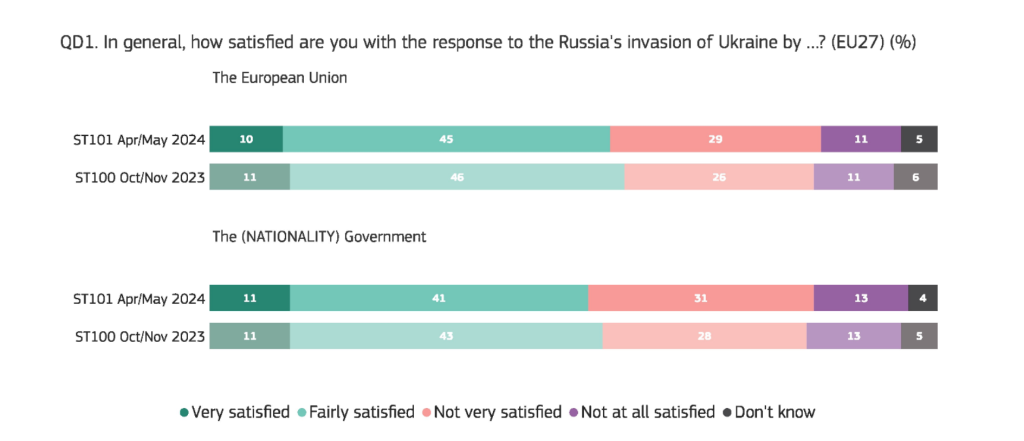
A closer look shows, once again, how the working class and less well-to-do, which have taken the brunt of the pain from the war through inflation, real wage declines, industrial decline, remains more opposed to the war than wealthier respondents:
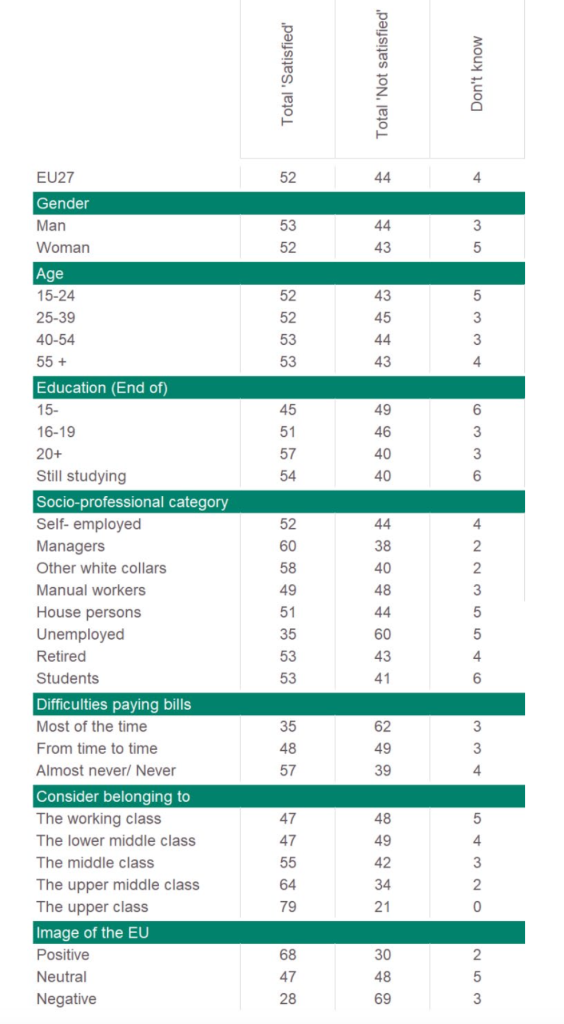
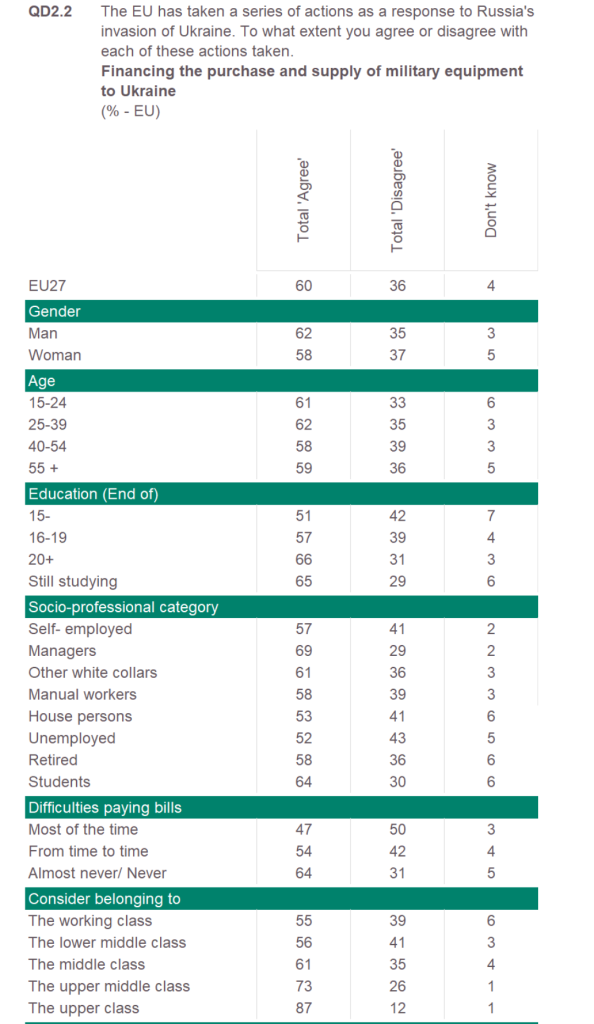
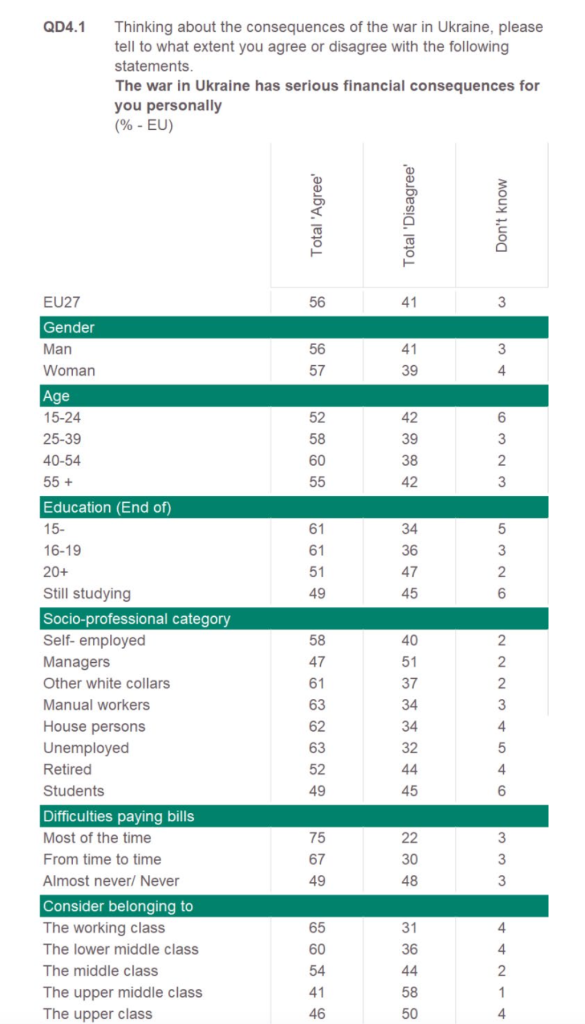
Support is dropping across the board:
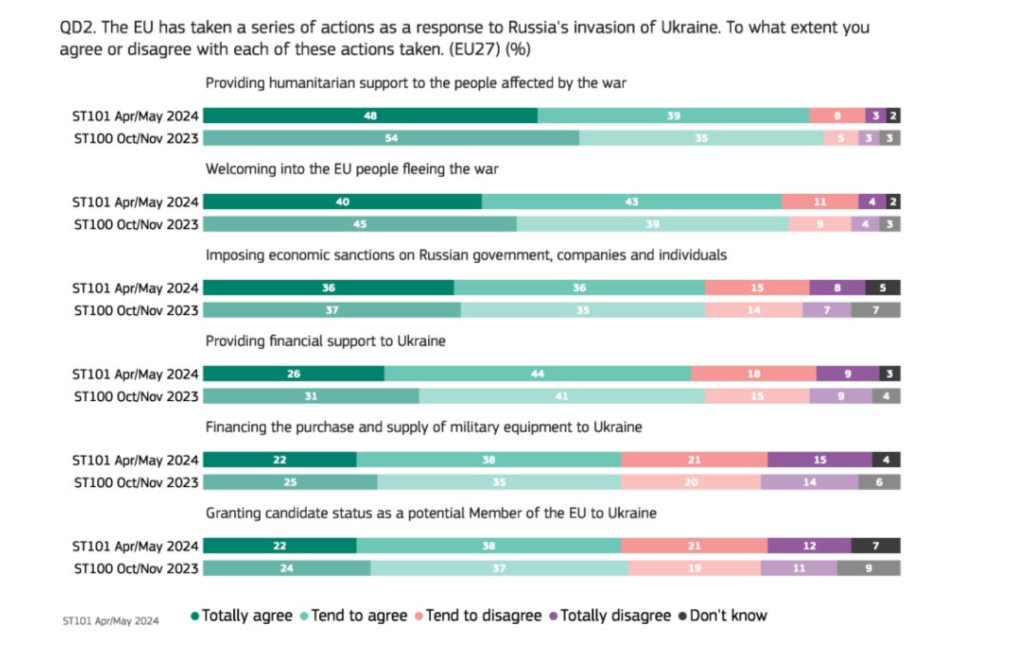
The questions that the Commission is likely paying the most attention to, however:
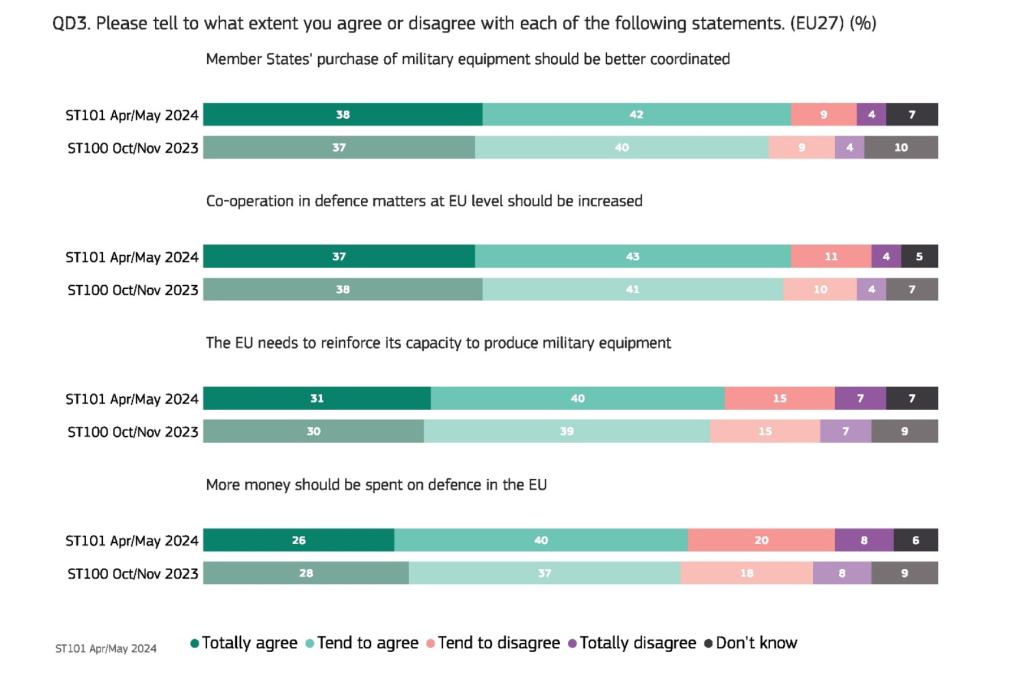
Let’s take a look at polling conducted in December from the European Council on Foreign Relations (ECFR):
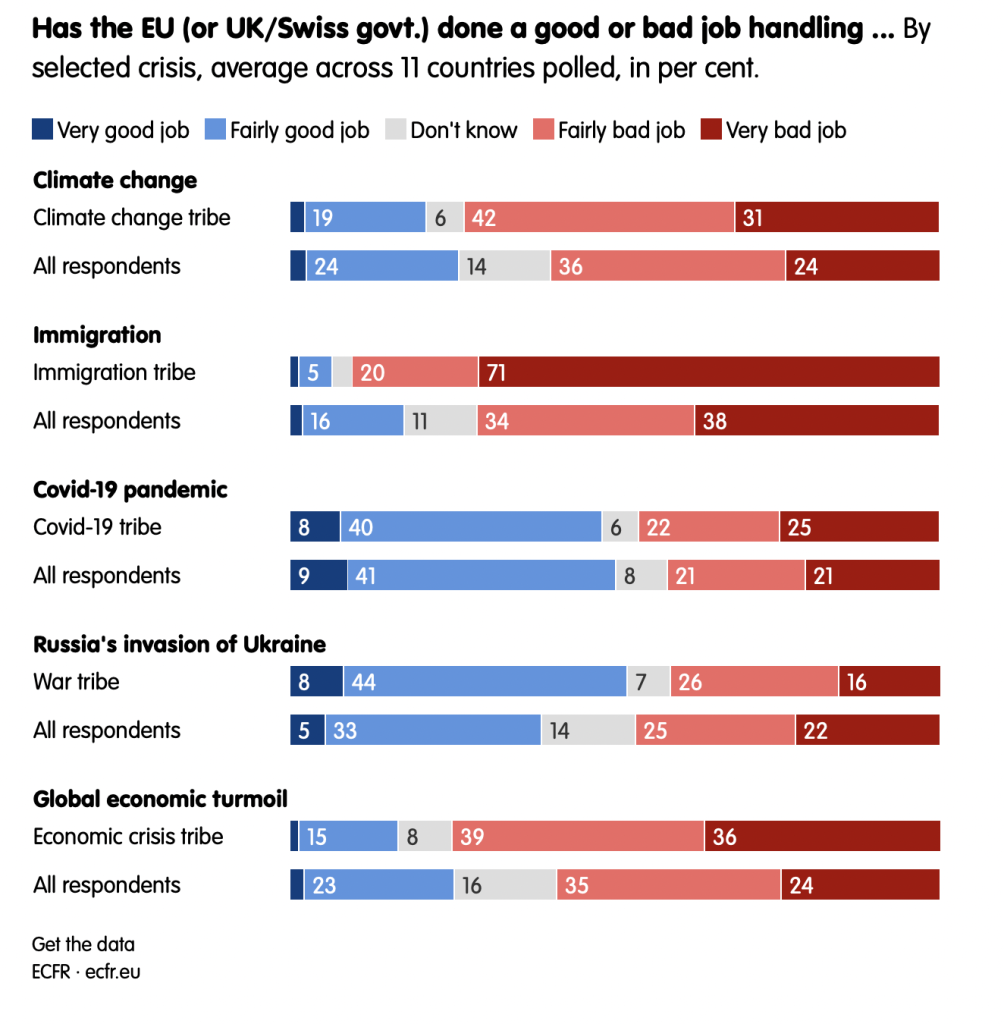
Notably, the ECFR points out the following:
If the war tribe needed a capital, it would probably be Tallinn – as the capital of the country with the largest percentage of people in that tribe, although Poland and Denmark also see the war at the top of their crisis lists (in Denmark it is tied with climate).
Naturally, the likely incoming EU foreign policy chief is Estonian Prime Minister and rabid Russophobe Kaja Kallas. Maybe she’ll be able to remind Europeans of the threat that Moscow is determined to march to the English Channel because fear of Russia is waning. From Euractiv:
Respondents fear climate-change-driven migration more than the security threat posed by Russia, according to a fresh survey for the Munich Security Conference (MSC) published on Monday (12 February).
European voters are also increasingly worried by “migration through war and climate change” and by the threat of radical Islamic terrorism, according to the latest Munich Security Index survey, which canvassed 12,000 people in the G7 countries, as well as Brazil, India, China, and South Africa.
The survey, which focused on 32 perceived risks, found that those threats are now viewed as even more important than a security threat posed by Moscow, which ranks fourth overall this year.
In last year’s survey, Russia’s war on Ukraine had been rated as the biggest threat to global security, particularly in the G7 countries.
While Russia was still the top risk for five G7 countries last year, only UK and Japanese citizens still consider it so this year, according to the survey. German citizens now only see Russia as the seventh greatest concern and Italians see it as the 12th.
Here are more recent May survey results from the European Council on Foreign Relations:
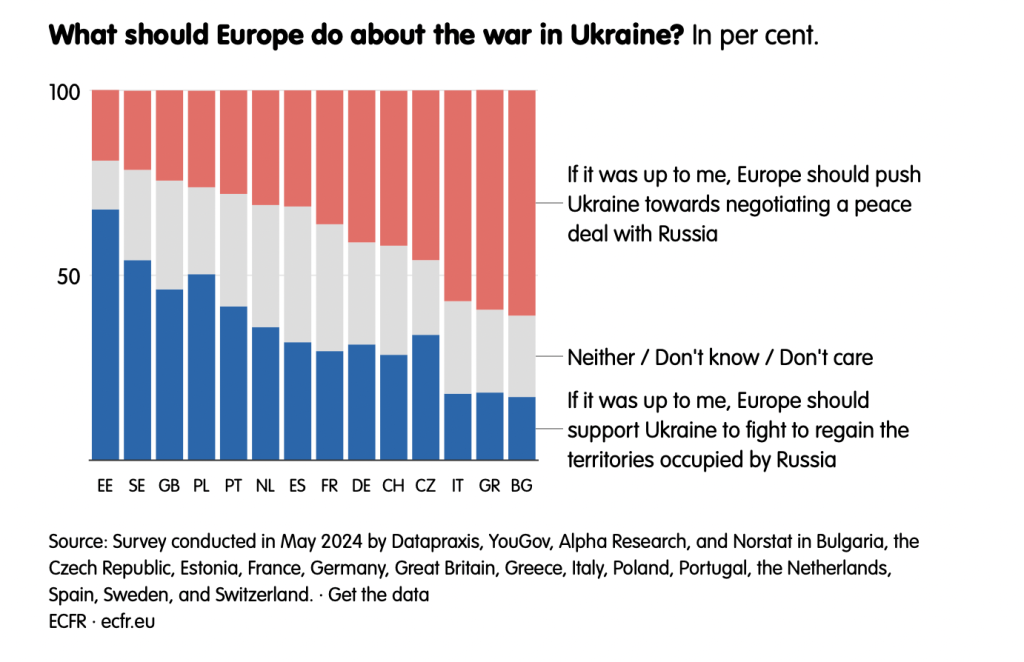
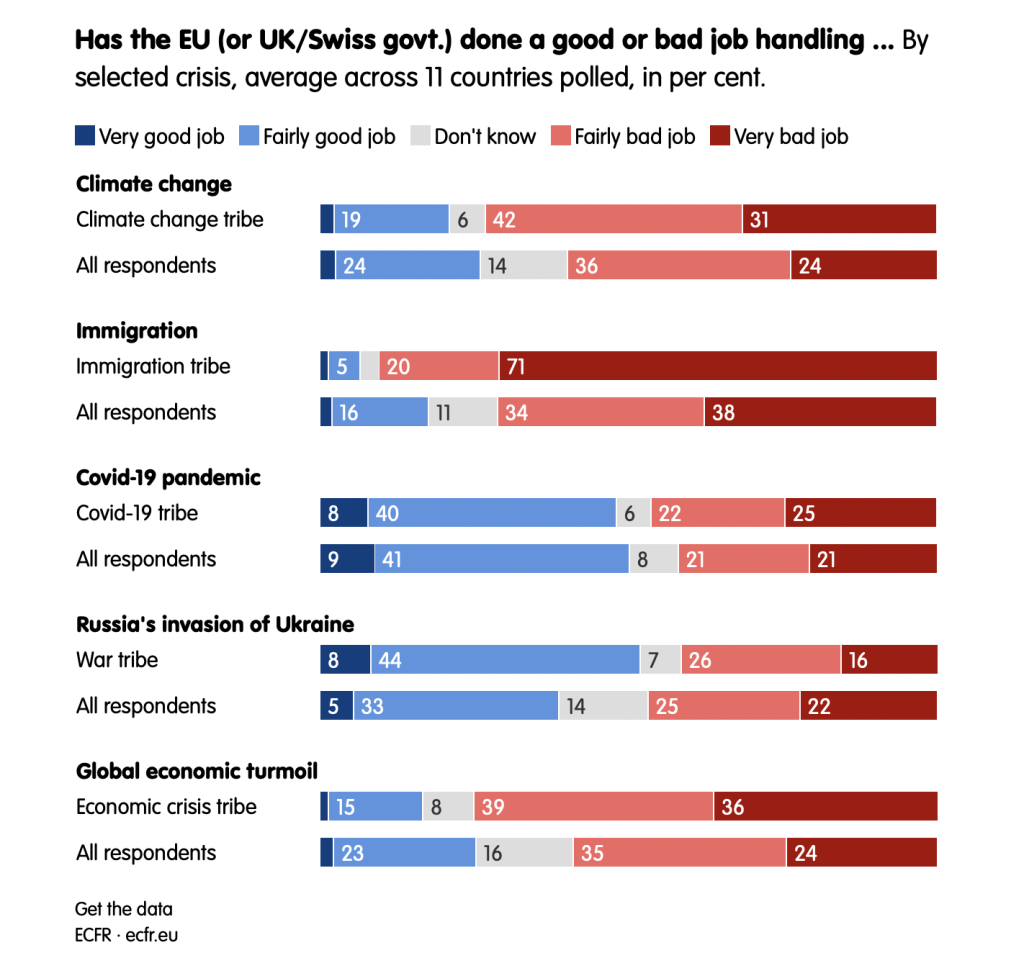
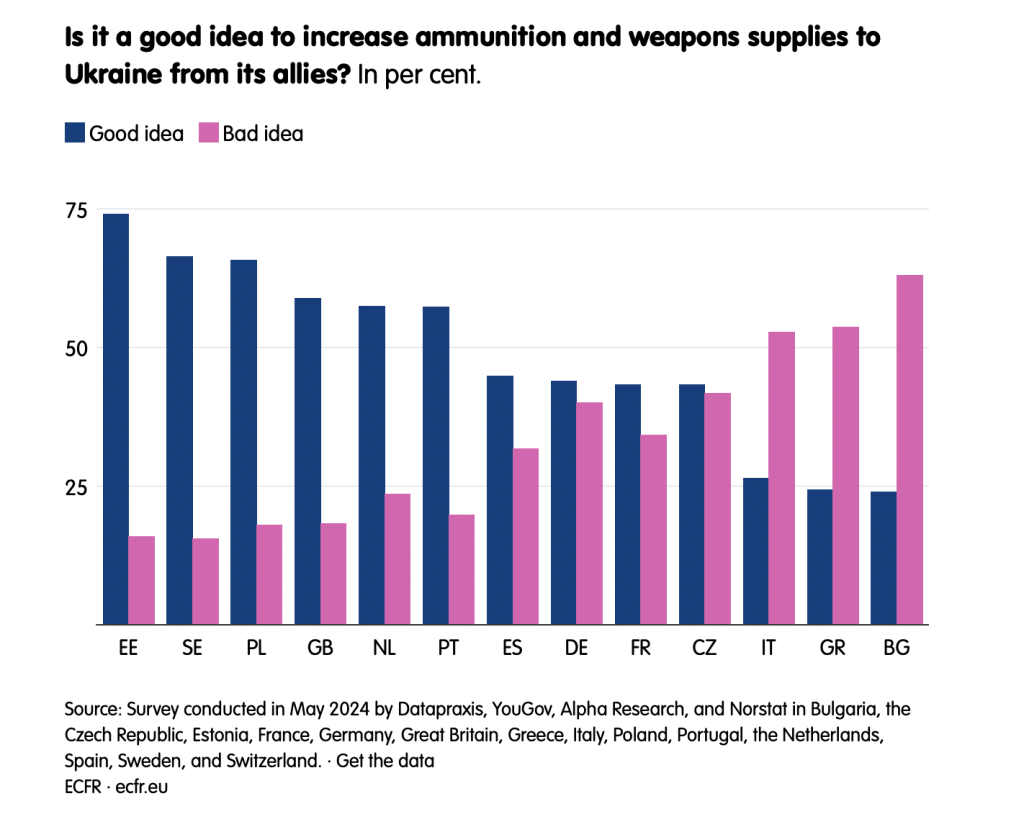
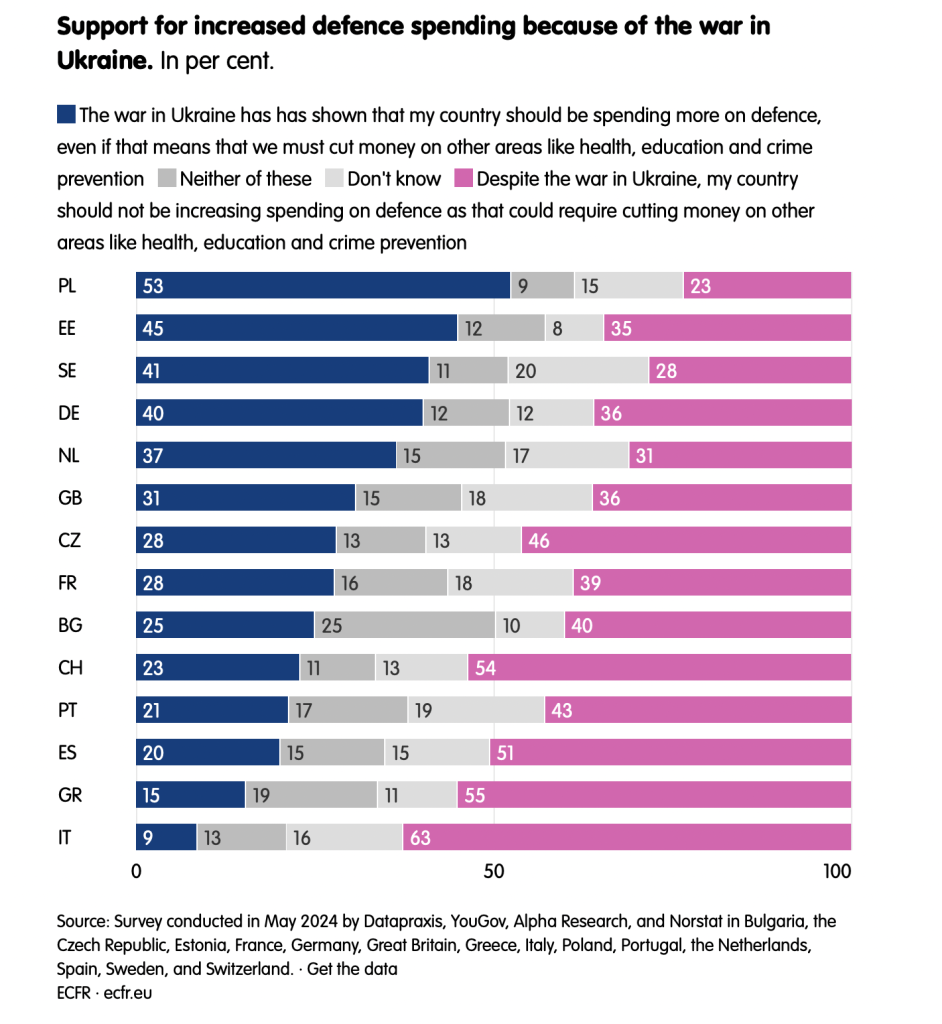
The question that the Commission is likely paying the most attention to, however:
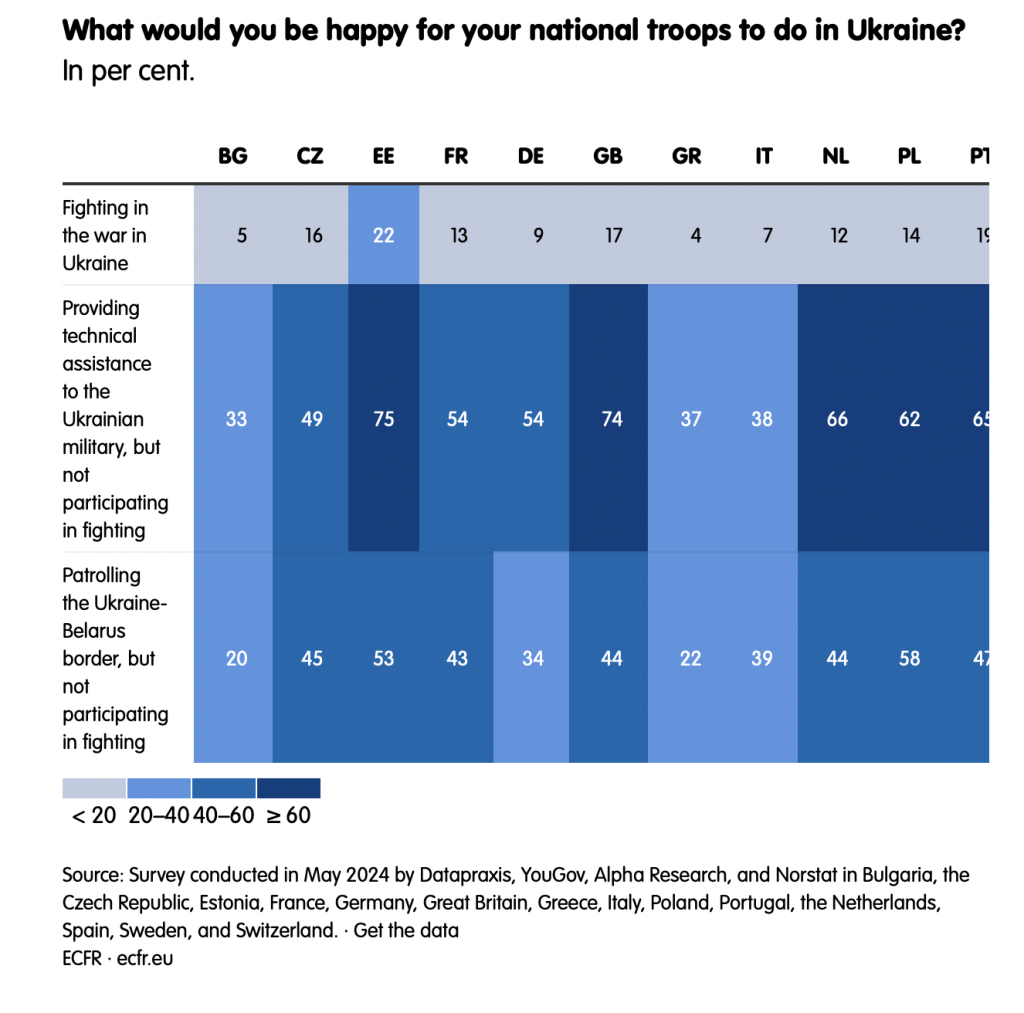
And even more polling that really backs Orbán’s position to seek a negotiated settlement:
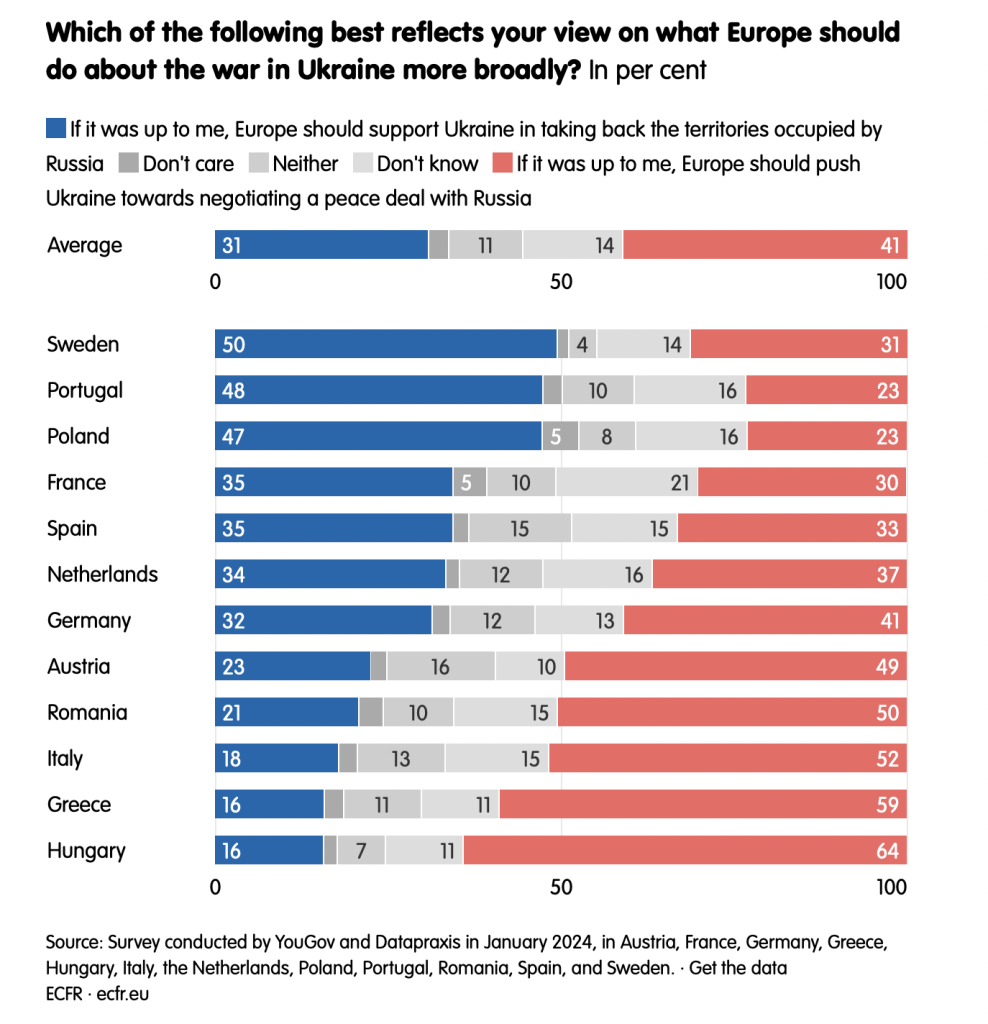
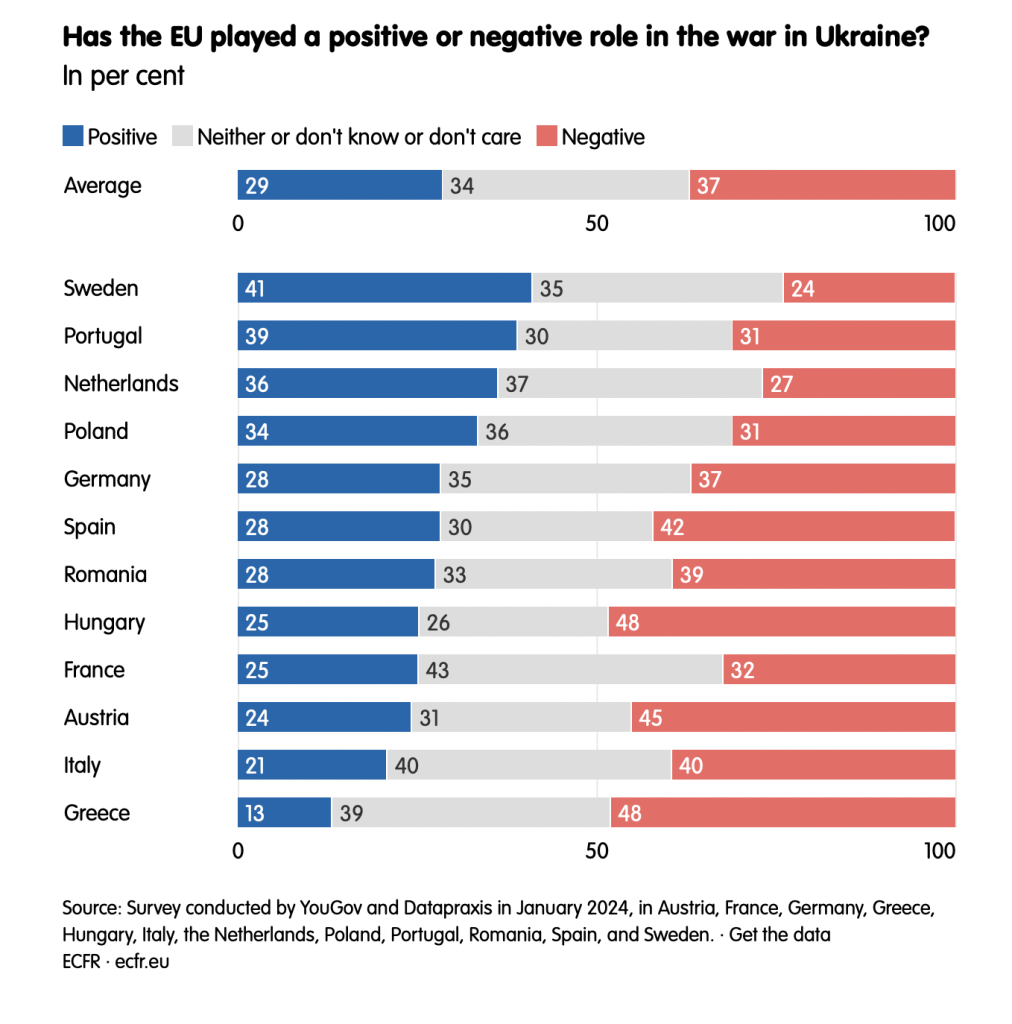
Polling That the European Commission Should Be Paying Attention to but Likely Won’t
Declining trust in institutions:
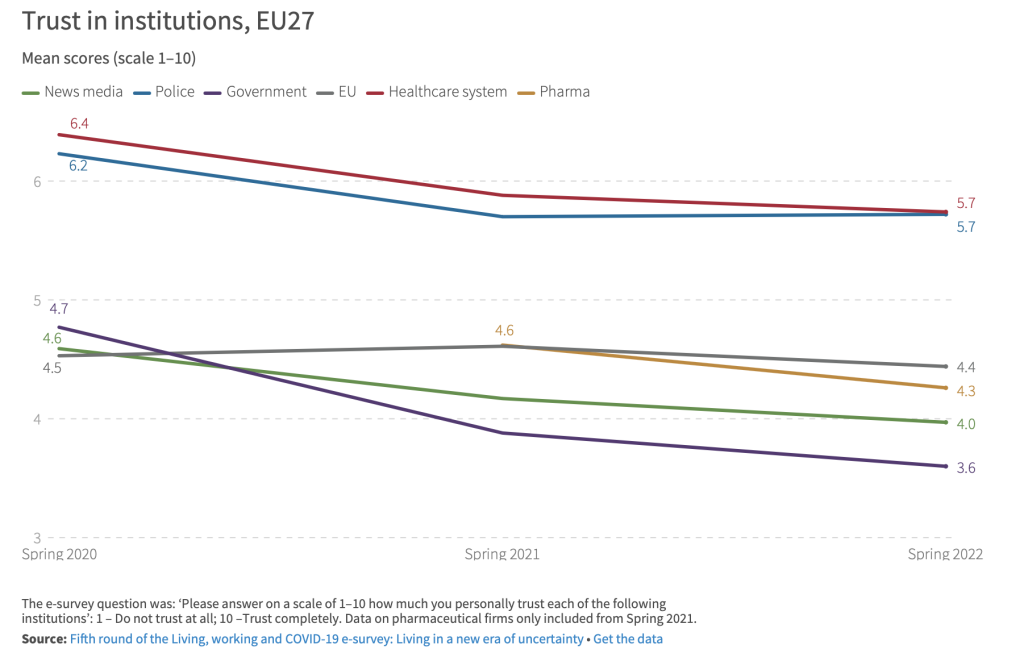
Broken political systems:
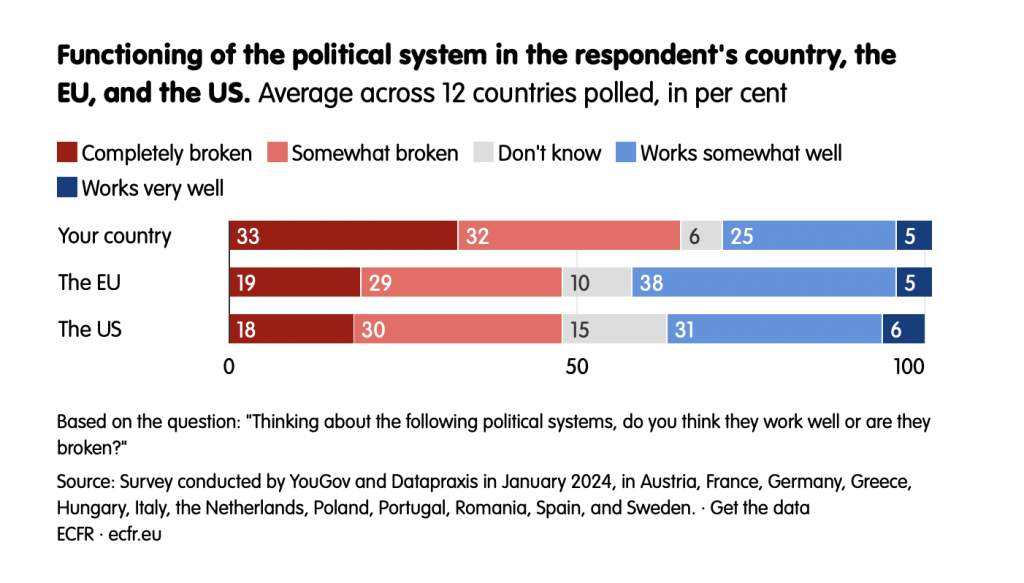
Things going in the wrong direction:
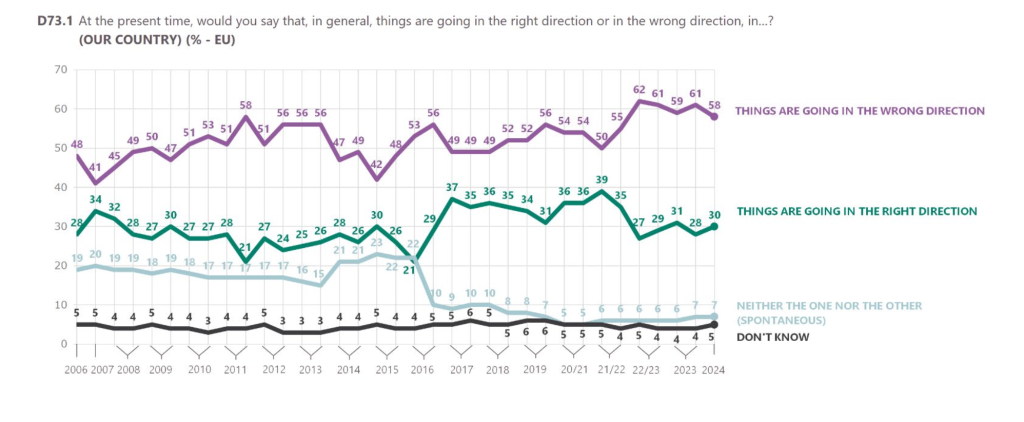
Quality of life getting worse for anyone not wealthy:
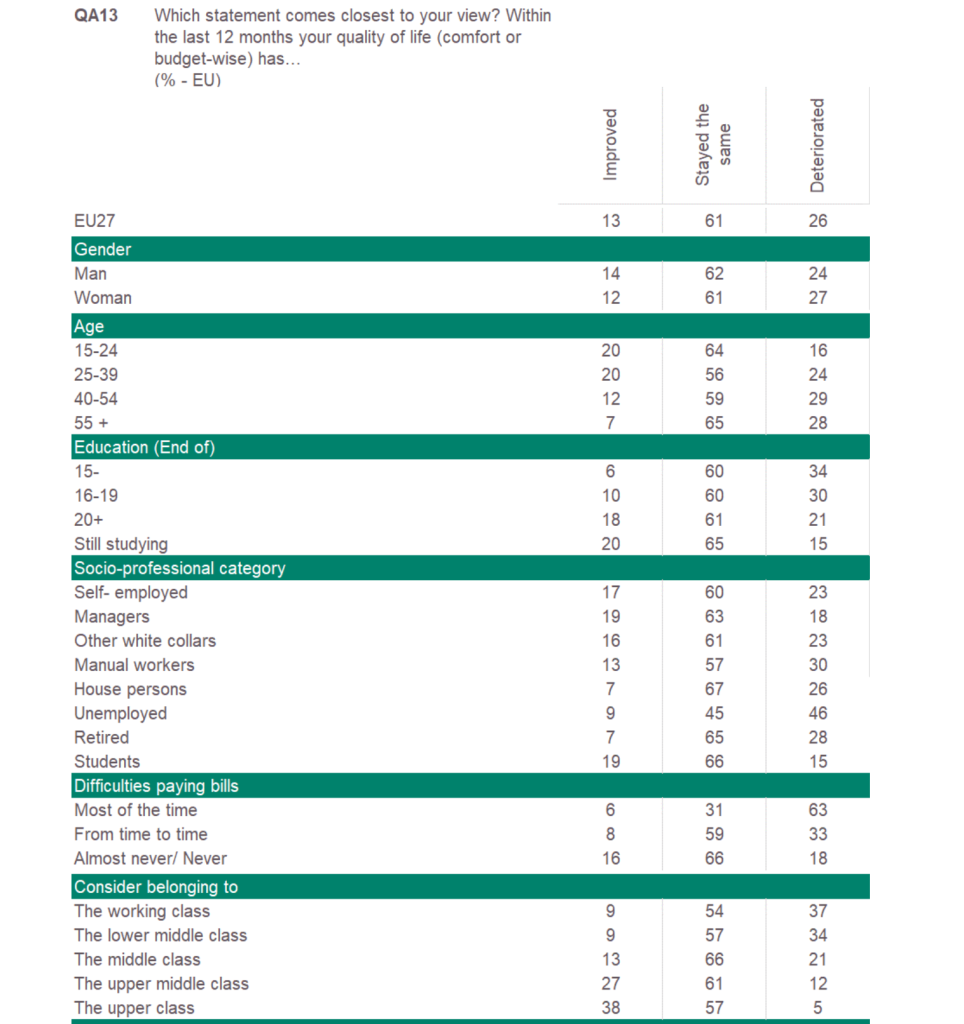
Among respondents who aren’t wealthy polls show widespread dissatisfaction with the economy and very little belief that prospects will improve:
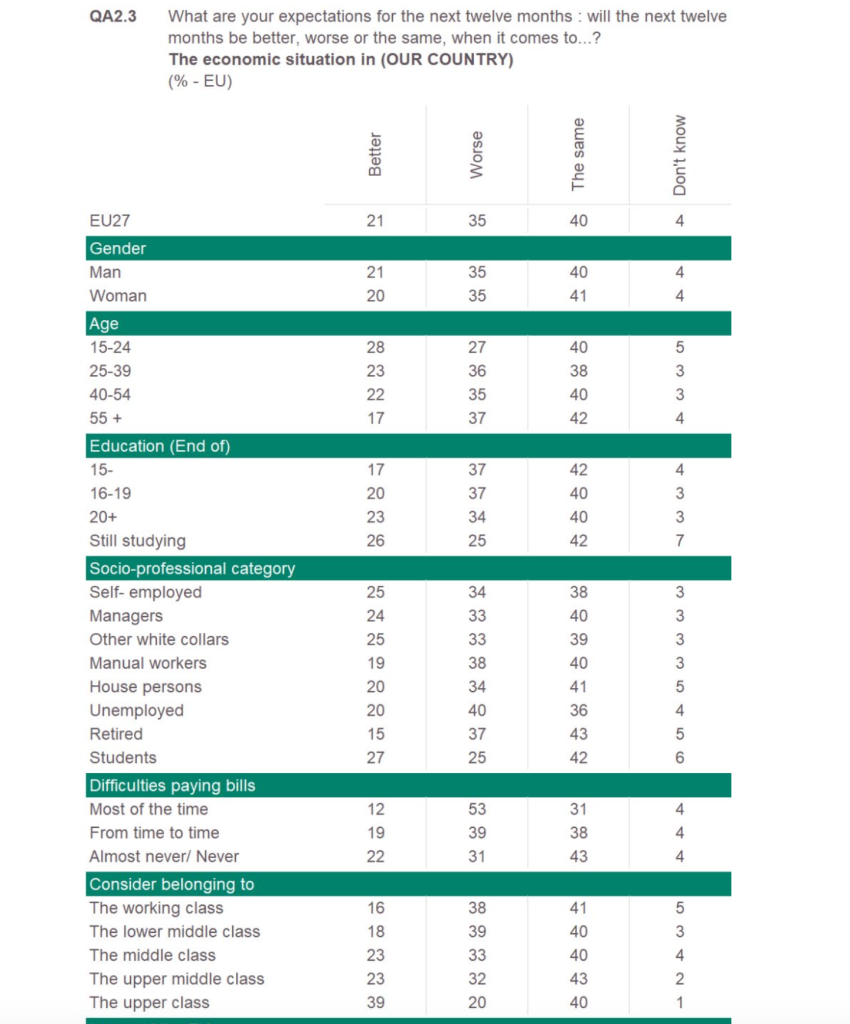
In conclusion, while Orbán might not end the war, he can remind Europeans that dialogue is possible. Maybe it leads people to wonder just what other European leaders are doing not meeting with Putin, Xi, Zelensky and trying to find some pathway to end the conflict. Maybe they start to look at Borrell, Kallas, Baerbock, whoever the French foreign minister is, etc. and wonder what exactly these people do all day other than repeat Washington talking points.
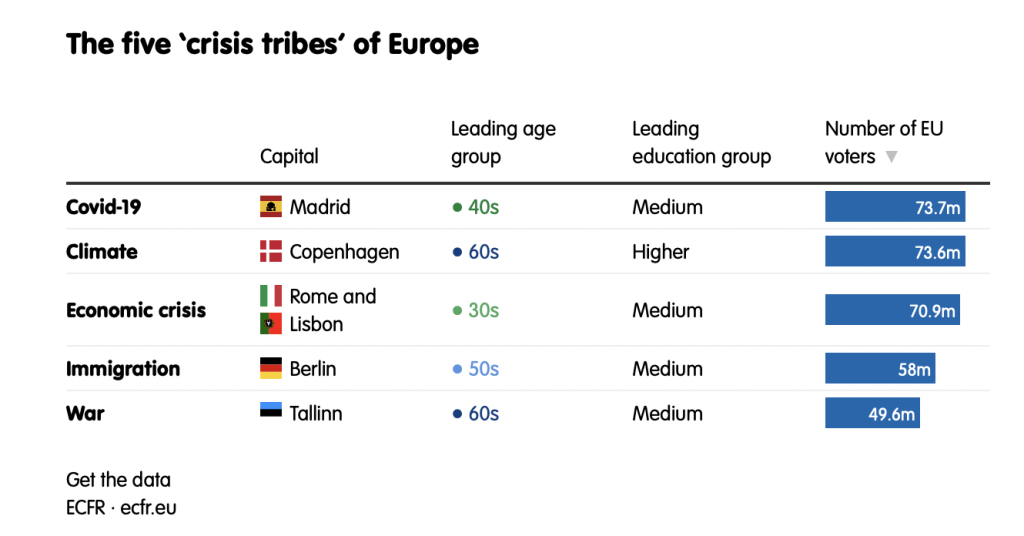


man, the europolitico site is just chock full of True Believers and parrots:
https://www.politico.eu/article/viktor-orban-europe-president-elections-2024-volodymyr-zelenskyy-xi-jinping-budapest/
several more just like that…sneering innuendo and a close eye on the russophobe style guide.
the west has descended to peewee herman level dialog.
Wow, that’s quite the lede in the Politico piece: “Since Budapest took over the rotating EU presidency last week, Hungarian leader Viktor Orbán has been zooming around like a cat on meth.”
And from AFP today: Orban is doing it all just to “troll” the EU, which is now going to “show him a yellow card.” The juxtaposition between the seriousness of the conflict and the juvenility of nearly every European leader continues to be alarming to say the least.
Politico are now recruiting their “reporters” from first-year university jocks? Actually, it might go well in a university satirical magazine. I’ve seen worse in the local one.
This does not exactly encourage me to trust Politico.
Go back to 2010 and forward and search for Orban in Western MSM publications and they’re all the same sneering disregard, if not outright denouncing of Orban as a dangerous guy. The MSM hasn’t changed a bit. / ;)
It’s encouraging that even in a storm of smug, ideological conformity, the worm shows signs of turning. Many thanks, Conor, for this wealth of data!
Same here. Good work, Conor.
I bet Hungary will join BRICS and exit EU.
Wouldn’t that be something.
One wonders why, of all the formerly pro-Soviet Eastern European countries, Hungary is the one where the US has thus far failed to install a compliant pro-American political layer. And Slovakia too, I suppose, though there it’s been a bit of a back-and-forth. [Technically, there is also Belarus, but it had not been an independent country prior to 1991. And it had not really been “pro-Russia” until the August 2020 elections and the attendant “pro-democracy” protests.]
Having a non-Euro currency helps, I suppose, but so does Poland, and in the last Polish elections it was the pro-American nationalist conservative party vs. an even more pro-American nationalist conservative party. The State Department deserves a whole plate of cookies for that one. Either Hungary has somehow slipped through the cracks, or there are some local political factors that the Americans have not been able to figure out. Maybe Orban has managed to lock down the political process to the extent of a Russia or a Japan, where opposition parties do exist, but are all but guaranteed never to approach the majority of seats in Parliament. In which case one wonders what happens when Orban retires or shuffles off his mortal coil. Or maybe we won’t have to wait that long, apparently 25% of Hungarian exports go to Germany, and much of the rest to other EU countries.
Incidentally, one wonders if the view of Kaja Kallas as a “rabid Russophobe” is overly simplified. To me, she looks like a typical careerist, who will say in public whatever she believes will get her patted on the head by the Americans (and the pro-American EU elites). To wit, the (presumably suppressed) scandal whereby her husband continued to do business in Russia all the way into 2023, with her personally lending 350k Euros to that business that same year. She strikes me more as a privileged kid who will say and do what “everybody” in her social circle says and does to get ahead. And she has gotten ahead – her husband has made millions trading with the Russians, and she got promoted to be the EU quasi-foreign minister (next step – Tony Blair Institute for Global Change, or some comparable sinecure). Which means that if tomorrow, magically, the US were to decide to be the best of friends with the Russians, Kallas and others like her would probably change their views and public stances on a dime, and pretend that the preceding years of Russophobia had never happened. Or so I would wager.
There is probably a thick book to be written about exactly how and when European politicians en masse decided to switch their allegiances from domestic economic elites to the American empire.
But back to Orban – if we’d had Obama running things rather than Biden sleeping through things, I’d have expected some serious regime change activities viz. Hungary by now. Orban is just such an outlier relative to almost everyone else in the EU (Fico too, I suppose, but his party has just made a comeback).
Kaja Kallas is indeed a privileged kid. Her father had some high position in Soviet times. She does talk about growing up in poverty and lacking candy, because she has to blame Russians for something.
The thick book to be written about exactly how and when European politicians en masse decided to switch their allegiances from domestic economic elites to the American empire, would have mostly one word in it: corruption. Orbán sticks out because he is not as corrupt as everyone else.
Her father was a high ranking official in Estonian SSR ministry of economy, and then a director of the Estonian saving bank. He was also the deputy editor of the Estonian Communist Party newspaper. After independence he became the director of the Estonian Central Bank and later an EU commissar in three commissions.
I guess Kaja Kallas has always been in the top 0.1% of Estonians, no matter if the family has been subservient to Soviet Union or European Union.
There have also been assertions that her grandfather was a member of a paramilitary organization under Nazi control in Estonia during WWII.
But her curriculum and the one of her father are enough to characterize them as cynical opportunists and unashamed turncoats. Well, since they managed to get top positions as apparatchiks, they probably have just the right mentality for that.
Regarding Hungary: it was already a kind of odd player in the Warsaw Pact — and even before that in KuK times. Not rebellious, but persisting in doing a few things in its own way.
There was that 1848 thing.
There’s also another – Serbia.
Battered and neoliberalized but still managing to avoid the total embrace with the Great Satan. Vučić is no Orbán intelligence wise – and the government is a corrupt mess – but it has balanced China, Russia and the EU.
One wonders why, of all the formerly pro-Soviet Eastern European countries, Hungary is the one where the US has thus far failed to install a compliant pro-American political layer.
A facile reason, but one possible contributing reason may be language. It is not likely easy to recruit enough speakers of Hungarian who are happy to work for NED, etc.
Just a quarter Magyar blood here, and culturally Romanian, albeit my childhood best friend was Magyar.
They have their unique language, are highly nationalistic with a great degree of self reliance, a little bit hot headed such that won’t shy on taking on the big ones, but wisened enough to have learned to look at the big picture and basic realities. Not many things have gone well for Hungary since 1526 onwards…
Orban is the first leader in a very, very, very long time that seems to see where the wind is blowing from… so kudos to him. In many respects he really has similar ideas like Ceausescu… believe it or not.
I don’t think that Orbán is even trying to end the war, or remind “Europeans” that dialogue is possible. I’d say that he is doing his best to stay afloat, and not go down with the EU Titanic.
Speaking of Orban, Mr. Soros does not have a high opinion of him.
From Project Syndicate, 2015, a short essay by Mr. S.
Rebuilding the Asylum System
“The exodus from war-torn Syria should never have become a crisis. It was long in the making, easy to foresee, and eminently manageable by Europe and the international community. Hungarian Prime Minister Viktor Orbán has now also produced a six-point plan to address the crisis. But his plan, which subordinates the human rights of asylum-seekers and migrants to the security of borders, threatens to divide and destroy the EU by renouncing the values on which it was built and violating the laws that are supposed to govern it. ”
https://www.project-syndicate.org/commentary/rebuilding-refugee-asylum-system-by-george-soros-2015-09
Oh, and how are the EU countries’ and economies doing these days? How are their middle and lower classes doing economically? Could it be the billionaires that are out of touch? / ;)
Here’s a thought: ending wars is a good way to end the refugee crisis.
If Soros doesn’t like it, it’s probably a good idea. He is the enemy of civilization.
Trouble is, the Soros vision of an Open Society has been remarkably similar to Harry Truman’s mentor and sponsor Tom Prendergast’s vision of Kansas City, Missouri, in the 1920s and 30s. Deeply corrupt politically and judicially, run by the gun with everything up for sale to the best connected low bidder but, sadly, without the blessing of the Basie band providing the mildest of offsets.
If I rmember correctly, Orban was the only leader that has blamed the Americans publicly for the wars in the Middle east and for all those refugees.
Well, I am pleased to see that Italy, along with Greece, is at the “bottom” of approval of the EU’s handling of these wars. In Italy, the dissatisfaction hasn’t quite translated into serious trouble for Giorgia “Putin Doesn’t Want Peace” Meloni.
The Fratelli d’Italia are still in charge of the “center-right” coalition in spite of scandals about Roman salutes, economic doldrums, and spurious constitutional “reforms.”
Of course, the alternative on the right would be Salvini and the Lega, now negotiating to join up with Vox and Orban’s Fidesz in a Patriot group in the Europarliament. Patriotism being the last refuge of scoundrels (and General Vannacci). And the mummified Forza Italia, Hillary Clinton’s natural home on the Italian political gamut.
Five Stars are about to join the Left group in the European Parliament. (I believe that Sinistra Italiana is already there.)
Meanwhile, Sleepy Elly Schlein seems to be imitating Sleepy Joe Biden, leading the Democratic Party slumberingly down some path to centrism and fossilization.
The long and the short of it: Don’t think for a minute that the unrest in the core/founding countries of the EU is somehow unrelated to the war and to Ursula’s neoliberalism. It is.
But the True Believers, Estonia and Poland, have all the answers. Or all of the doubleplusgood answers to continue the carnage. Until three Russian sailboats show up and blockade Tallinn harbor.
Pass the vitello tonnato.
I second this when talking about Romanians. But you would get a different opinion by listening to or reading the media there…
The thing with Orban is that he was not actually negotiating a treaty but going to the main countries to get an understanding of what their stance is. So that meant the Ukraine, Russia, China and now the US. In the olden days this was known as “diplomacy”. But I am pretty sure that the Global Majority was watching what he was doing and noting how the EU leaders came out and said basically that there will be no negotiations – not now and not ever. As low as the reputation of the EU leadership was, for them it is now lower than whale s***. And this will effect their own relations with the EU as they know for sure now that the leaders of the EU are not serious people but merely petty ones. But maybe, just maybe, Orban has broken the taboo about using diplomacy as that will be the only way forward.
Tribalism – what happened to the rich tribe, the poor tribe, financial capitalist tribe, industrial capitalist tribe, the democratic tribe, the peace tribe.
Good work above but, all things measured by the cash and nothing else – at least it seems the cash criteria is, and has been the only criteria for many years —- a pre filter to all.
Happiness? progress? cohesiveness? cooperation? humanity? basic prosperity?.
I guess 30? years of TINA, 25? years of ‘your either for us or against us’ and maybe 60? years of binary have done it’s work.
There’s a very long institutional history to this, going back to the two-pillar structure of the Maastricht Treaty. Defence, Foreign Policy and Security were to remain national competences, and come under the Council. But for thirty years the Commission has been trying to worm its way in, and, under Von de Leyen, and with a European ruling class captured by Brussels, it may finally be succeeding. Ukraine is ultimately the Council’s business, not the Commission’s